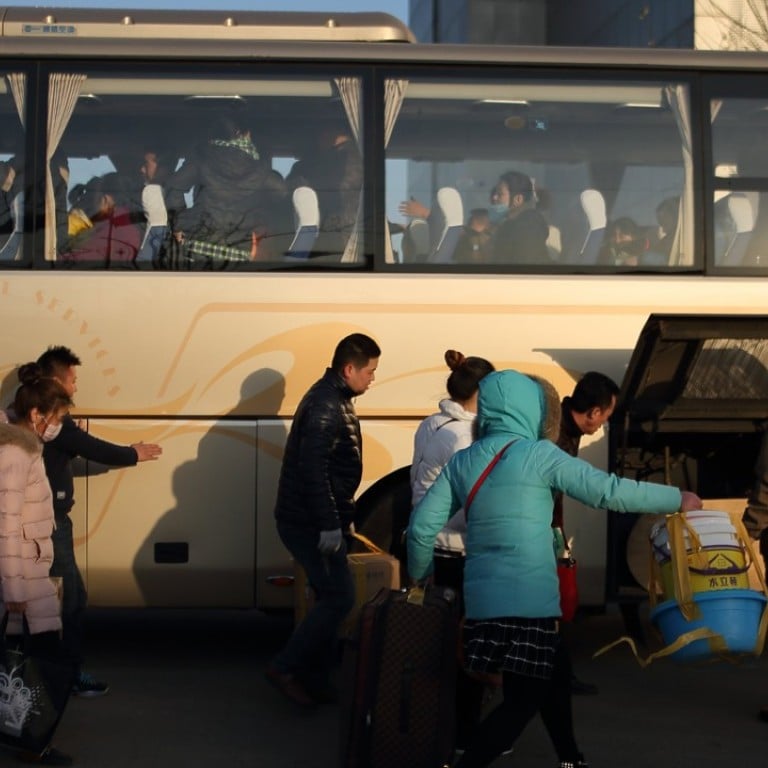
Beijing’s eviction of migrants exposes officials’ prejudice and ignorance of human rights
Deng Yuwen says city governments in China should respect people’s freedom of mobility. Sacrificing migrant welfare to compensate for the failings of the capital’s population control policy is shameful discrimination
As the capital, Beijing has access to the best resources in the country, and it draws Chinese from all over the country to live and work there.
To be fair, compared with other Chinese cities, Beijing is not particularly hostile towards outsiders. Faced with an influx, the government has had to repeatedly adapt its policies to cope with the problems this brings, including resource shortage, traffic congestion and a deteriorating social order.
Under the circumstances, the authorities introduced a raft of stringent measures in recent years to force “foreigners” out of the capital. These include strictly controlling the increase of housing units, banning the group-leasing of properties, shutting down markets for low-end consumer goods, and raising the entry bar for children of non-native residents seeking an education. Meanwhile, migrants became known not just as “foreigners”, but also “low-quality population” and “low-end population”.

The measures failed to curb the numbers, and Beijing only succeeded in driving the “low-end people” to the city’s fringes and remote outskirts. District authorities turn a blind eye to the areas mostly inhabited by migrants, and most do not bother to provide even basic public services. Worse, in some cases, the incorporated village – at the bottom rung of the hierarchy of urban administrators – even takes the opportunity to engage in rent-seeking, charging high fees for water and electricity. Then, in the event of an accident or a campaign, the authorities would enforce the law and ruthlessly drive out the migrants.
Beijing’s cruel eviction of its migrant workers is a stain on China’s urbanisation drive
This is what we’re seeing in the wake of the fire in Daxing district two weeks ago. Tenants were told to leave within days, despite the cold weather, and given no resettlement plans and no compensation. Some were given just a day’s notice to move out, before the water and electricity supply was cut off and their belongings thrown away.
Their eviction reflects two related problems: the backwardness of China’s urban management, and the dangers of a political system in which those who are tasked with execution blindly follow orders to meet certain policy objectives.
Municipal authorities must update their backward thinking. Otherwise, more large-scale evictions will happen.
First, municipal officials lack awareness of basic human rights. Even though people’s freedom of mobility is not stated in the constitution, after decades of economic reforms and opening up, this right is taken for granted. The problem is, it is not recognised by the municipal authorities, nor included in the law and city policies. In fact, the hukou household registration system itself – by dividing the population into natives and non-natives – violates human rights. When human rights are not respected, ordinary people become more vulnerable to power abuse.

Evictions waken Beijing middle class to plight of migrant workers
Second, describing migrants as “low-quality” or “low-end” is not only an insult to them, but also reflects the vulgar notion that a person is defined only by their job. Those with high academic qualifications and professional jobs are “high-quality” people, while those with low-end jobs are “low-end” people. Migrant workers who mainly do dirty and physically demanding work are therefore “low-end” – that’s the logic of the Beijing municipal government. Officials should understand that labelling a person based on the work they do is highly discriminatory. In fact, strictly speaking, the different industries and jobs are themselves neither high nor low.
Third, the Beijing municipal authorities do not understand the different roles a city should play and how they should be managed. Beijing may indeed have good reason to trim the city’s “non-capital functions”, in view of its plan to reposition the capital and also the need to ease its social problems. But no matter how “high end” a city becomes, it still needs diversity to remain vibrant. Chasing away the migrants is one way of killing such diversity. Moreover, the measures the government took to eliminate this diversity was violent and inhuman, and made migrants the sacrificial lambs in its drive to remake the capital city.
Beijing’s boss warns against official haste as migrant workers reel from wave of evictions

Chinese intellectuals urge Beijing authorities to stop ‘forcing’ tens of thousands of migrant workers out of city
The blind spots described above afflict not just the Beijing municipal authorities, but also the other city governments. In Shenzhen, a typical immigrant city, for example, the authorities have tried to evict the so-called “high-risk” group of jobless migrants.
Beijing is often held up as a role model for other Chinese cities. Therefore, it must be persuaded to stop this damaging campaign to clear out migrants.
In time, the household registration system in the big cities must be abolished and the freedom to live and migrate must be stated in the Chinese constitution. However, if officials do not learn better governance, that day may not come soon.
Deng Yuwen is a researcher at the Charhar Institute think tank. This article was translated from Chinese

